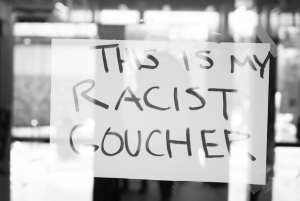
On November 14 at 8:56 a.m., Javaunte Neumann, ‘20, posted a screenshot of a Snapchat he received from a friend to the Class of 2020 Facebook page. The Snapchat was captioned, “Cops knocked on my door. Someone wrote on the first stall of the bathroom, ‘I’m gonna kill all n********’ and listed my room number and two other numbers on my floor, damn this school is great.”
At 10:17 a.m. the same day, the Goucher student body received an email entitled “Report of Hate Crime on Campus.” The message, signed by Bryan F. Coker, Ph.D., Vice President and Dean of Students; Nicole J. Johnson, Interim Associate Dean of Students/CREI; and David Heffer, Director of Public Safety, gave the basic story of what happened: early in the morning, a student found “threatening anti-Black graffiti” that targeted students on the first floor of Jeffrey, where the graffiti was found. The Baltimore County Police were called right away, and began an active investigation into the hate crime.
In an interview with the Quindecim, Neumann and Brandon Julot, ‘20 asserted that Goucher’s administration had not done enough to handle the situation. It was “not just a racial slur, it was a threat on our lives,” said Neumann, adding that the black community is “fed up.” Julot added also that the graffiti was a “clear threat [that] should be taken seriously,” in a way that simply stating as “threatening anti-Black graffitti” did not denote. Neumann also mentioned that during his first year on campus, a noose had been drawn on his door, and that he had several friends who had been similarly targeted, and not received more information on the case after an initial follow-up with the Office of Public Safety.
When asked about how Goucher could hold its community accountable to responding to hate crimes and changing its cultural narrative, Julot and Neumann both identified that the Center for Race, Equity, and Identity (CREI) needs a space that is more accessible and no longer what Neumann argues is a “marginalized area” on the fourth floor of the Athenaeum. Both Julot and Neumann also indicated interest in forming coalitions between the black community on campus and other marginalized communities, particularly trans and Muslim communities, who have been targeted by hate crimes in previous semesters.
Later during the afternoon of November 14, Residents of Jeffrey House received an email from Lindy Bobbitt, Director of Residential Life. Beyond naming the hate crime and offering support, Bobbitt made it clear that is is her job to ensure that students feel safe in their housing.
A few hours later, in a brief email to the student government, Goucher Student Government made the following statement: “Goucher Student Government was very disturbed and concerned by the anti-black hate crime that was discovered this morning in the first floor of [Heubeck] Jeffrey. Goucher’s campus should feel safe for black students. Acts of hate such as this one will not be tolerated here, and should not be tolerated anywhere. Goucher Student Government is prepared to offer resources in any way we can as time moves forward. Please expect future updates from Goucher Student Government in the coming days.”
The Office of Communications sent a message to the college community, signed by President Bowen, on November 15 at 10:50 a.m. Bowen noted that the Baltimore County Police Department (BCPD) was alerted of the graffiti “immediately,” and that the first priority was the safety of the students affected. “An incident such as this has repercussions across our campus. Once we were confident that the targeted students were secure, and that we could share information which would not impede the investigation, we issued a statement to the campus at 10:15 am, and to parents shortly after that. We will continue to provide support services for targeted students and others who desire support. Our other top priority will be supporting the police investigation and ensuring that we do not compromise those efforts.”
In an update sent out on Friday, November 16 at 1:41p.m., Dean Coker modified the language used to refer to the hate crime. In this message, he described the nature of the crime as having an “undeniably pervasive message in the graffiti was anti-Black and clearly targeted at specific Black students, by even sharing room numbers where they reside.”
Coker also noted in the email that “there was also a backwards swastika” included in the graffiti, corroborating a piece published at 7:05 p.m. on November 14 by the Baltimore Sun. Goucher Hillel, along with faculty from the Center for Psychology and the Center for Geographies of Justice sent out specific condemnations of the hate crime via email as well.
For information relating to the demonstration organized by Umoja on Friday, November 16th, read publications written by the Goucher Eye.
The Baltimore Sun, a news organization working to record and track hate crimes as a part of ProPublica’s “Documenting Hate” database, has aggregated its information received through “a public information request” from police reports. Of the 692 incidents aggregated by the Sun, eight of them list the victim as “Goucher College.” Of these eight reports of hate crimes on campus, four were anti-transgender, three were anti-Black, and one was anti-Muslim.
As defined in the college’s Annual Security and Fire Safety Report, “A Hate Crime is a criminal offense that manifests evidence that the victim was intentionally selected because of the perpetrator’s bias against the victim. Bias is a preformed negative attitude toward a group of persons based on their race, gender, gender identity, religion, disability, sexual orientation, ethnicity or national origin.” The Report presents the following information for hate crimes on campus during the years 2015-2017: one in 2015, two in 2016, and ten in 2017. It is unclear why one anti-transgender and one anti-black hate crime were not included on the Baltimore Sun’s website.
*Online edit: David Heffer’s reply for comment is posted in a separate column, as his responses came after the print publication deadline.*
